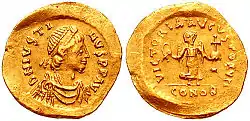518
Year 518 (DXVIII) was a common year starting on Monday (link will display the full calendar) of the Julian calendar. At the time, it was known as the Year of the Consulship of Paulus without colleague (or, less frequently, year 1271 Ab urbe condita). The denomination 518 for this year has been used since the early medieval period, when the Anno Domini calendar era became the prevalent method in Europe for naming years.
| Millennium: | 1st millennium |
|---|---|
| Centuries: | |
| Decades: | |
| Years: |
| 518 by topic |
|---|
| Leaders |
| Categories |
|
| Gregorian calendar | 518 DXVIII |
| Ab urbe condita | 1271 |
| Assyrian calendar | 5268 |
| Balinese saka calendar | 439–440 |
| Bengali calendar | −75 |
| Berber calendar | 1468 |
| Buddhist calendar | 1062 |
| Burmese calendar | −120 |
| Byzantine calendar | 6026–6027 |
| Chinese calendar | 丁酉年 (Fire Rooster) 3214 or 3154 — to — 戊戌年 (Earth Dog) 3215 or 3155 |
| Coptic calendar | 234–235 |
| Discordian calendar | 1684 |
| Ethiopian calendar | 510–511 |
| Hebrew calendar | 4278–4279 |
| Hindu calendars | |
| - Vikram Samvat | 574–575 |
| - Shaka Samvat | 439–440 |
| - Kali Yuga | 3618–3619 |
| Holocene calendar | 10518 |
| Iranian calendar | 104 BP – 103 BP |
| Islamic calendar | 107 BH – 106 BH |
| Javanese calendar | 405–406 |
| Julian calendar | 518 DXVIII |
| Korean calendar | 2851 |
| Minguo calendar | 1394 before ROC 民前1394年 |
| Nanakshahi calendar | −950 |
| Seleucid era | 829/830 AG |
| Thai solar calendar | 1060–1061 |
| Tibetan calendar | 阴火鸡年 (female Fire-Rooster) 644 or 263 or −509 — to — 阳土狗年 (male Earth-Dog) 645 or 264 or −508 |

Emperor Justin I (518–527)
Events
Byzantine Empire
- July 9 – Emperor Anastasius I dies childless at Constantinople, age 88, after a 27-year reign in which he has abolished the sale of offices, reformed taxation, and perfected the empire's monetary system, but antagonized some with his heretical Monophysite religious policies. He is succeeded by Justin (Flavius Justinus), his comes excubitorum, commander of the palace guard. After his death, he leaves the imperial treasury richer by 23,000,000 solidi or 320,000 pounds of gold.[1]
- Justin I founds the Justinian Dynasty and makes his nephew Flavius Petrus Sabbatius (later Justinian I) his trusted advisor. He becomes the emperor's close confidant and acts possibly as regent.[2] Theocritus, candidate to the throne, is accused of a conspiracy and executed.
Balkans
- An earthquake destroys the Illyrian (Macedonian) city of Scupi (later Skopje), in what once was the Roman province of Moesia Superior.
Arabia
- Jabalah IV becomes the king of the Ghassanids. He invades Palestine, but is defeated by a Byzantine army under general (dux) Romanus.[3][4]
Religion
- September 29 – Severus, patriarch of Antioch, is deposed by a synod for his Monophysitism. Paul the Jew is appointed to replace him.
Births
- Matasuntha, queen of the Ostrogoths (approximate date)
- Mungo, Brythonic apostle and saint (approximate date)
- Yōmei, emperor of Japan (d. 587)
Deaths
- July 9 – Anastasius I Dicorus, Byzantine emperor
- July – Theocritus, Byzantine pretender
- Flavian II, patriarch of Antioch
- Gao, Chinese empress of Northern Wei
- Moninne of Killeavy, one of Ireland's early women saints (approximate date)
- Sanghapala, Mon-Khmer monk (b. 506)
- Tonantius Ferreolus, Gallo-Roman senator (approximate date)
- Yu Zhong, official and regent of Northern Wei (b. 452)
References
- P. Brown, The world of late antiquity, W.W. Norton and Co. 1971 (p. 147)
- Moorhead (1994), p. 21-22, with a reference to Procopius, Secret History 8.3.
- Martindale 1980, p. 489
- Shahîd 1989, p. 121, 125–127; Greatrex & Lieu 2002, p. 51
- Bibliography
- Martindale, John R., ed. (1980). The Prosopography of the Later Roman Empire: Volume II, AD 395–527. Cambridge: Cambridge University Press. ISBN 0-521-20159-4.
This article is issued from Wikipedia. The text is licensed under Creative Commons - Attribution - Sharealike. Additional terms may apply for the media files.